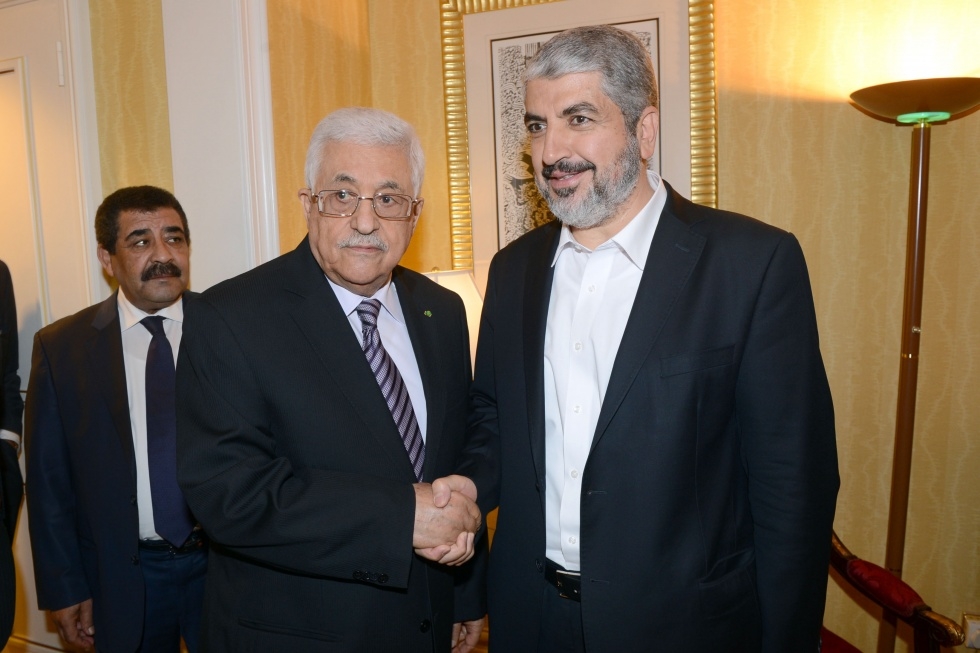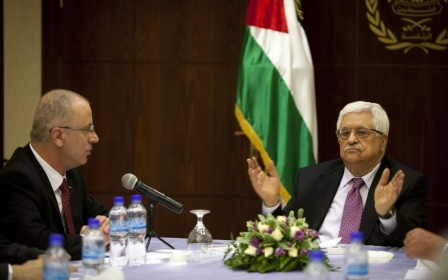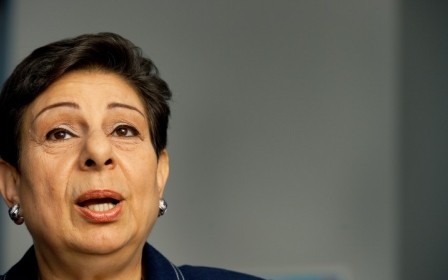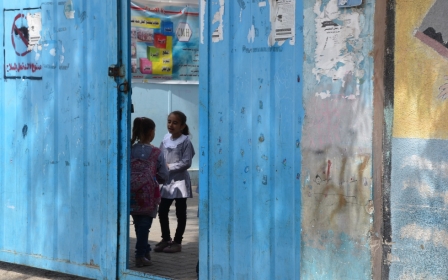Exclusive: Khaled Meshaal says only Palestinian unity will force Israel to change

DOHA - Only Palestinian unity and the reconciliation currently underway between Hamas and Fatah working together to form an effective national strategy will force Israel to the bring the occupation to an end, Khaled Meshaal the leader of Hamas told the Middle East Eye.
Speaking in an exclusive interview from Doha, the Hamas leader said no Palestinian should wait for the Israeli Prime Minister Benjamin Netanyahu to change their policies voluntarily.
“Neither Israel nor any occupier will change its policy voluntarily. It must be forced to change itself and our resistance, unity and steadfastness will change them. We are not waiting for Netanyahu to change himself. We Palestinians have the ability to change them. This is our strategy,” Meshaal said.
On Monday, the Palestinian president swore in the new unity government, after a last-minute concession to Hamas that the Ministry for Prison Affairs would not be dismantled, but be given to the prime minister of the new government Rami al-Hamdallah.
Israel called on the international community not to recognise the unity government but the US said it intended to work with it, for now.
The leader of Hamas reacted by saying that Palestinian democracy and national reconciliation was a right for their people which should be respected by the whole world.
“As for the US decision to work with the new Palestinian government, although its relatively a new stance of the US administration, its not enough, given that its still based on putting terms on the Palestinian government. Not to mention the biased and unjust US administration stance against the Palestinian people, putting Hamas on the terrorist list, and considering the Palestinian resistance and struggle as an act of terrorism”.
Two factors lay behind Hamas’ assessment that reconciliation had a much better chance of success today than with previous attempts, Meshaal said. First was the length of time the two sides had been divided. It has been seven years since the Palestinian Authority split into two in June 2007 and this “ long time span” had been a heavy burden on both sides: ”Neither of us can defend the position of continuing the division,” the Hamas leader said.
The dead end reached by the Palestinian negotiator in these talks with Israel also helped, an impasse that Meshaal attributed to the “extreme stubbornness” of the Israeli government: "This forced Palestinians to look inside to their internal politics. Nevertheless obstacles still exist, especially the Israeli threats and the damage that is being done by them and the pressure international players could exert on Palestinians to hinder or damage the reconciliation,” Meshaal said.
The Hamas leader did not attempt to downplay the differences that still exist with Fatah, particularly over the issue of the security practises of the Palestinian authority and its decision to maintain security co-operation with Israel as the unity government was being formed.
But Meshaal did not attempt to score political points over Mahmoud Abbas, the Palestinian President: "First of all we have a different political agenda. Its a reality. We all realise that we have our differences on different topics, among them the security co-operation issue. The new thing is the realisation common to both sides that those differences will widen if we are divided. We now have the chance to bridge that gap and this is what we are trying to do.”
Meshaal denied that Hamas had been forced into the unity deal because its government in Gaza had run out of money or that there had been division between the Hamas in Gaza and the West Bank over going into the pact with Fatah.
“Yes, Gaza is suffering from the continuing siege and the destruction of the tunnels, and this is not what is driving us to reconciliation, but this is not a new issue in the Hamas agenda.“ He said several attempts had been made to get a unity deal, referring to the Mecca deal in 2007, an accord signed in Cairo in 2011, and the Doha deal signed a year later. The real chance came in 2013 with the efforts of the Egyptian Presidency and the Egyptian General Intelligence service. This failed because Kerry prioritises negotiations with Israel over the reconciliation. “This history proves that Hamas’s stand on reconciliation is a matter of principle, so we worked sincerely on reconciliation in all times, good or bad, difficult or easy.”
Meshaal said the decision on going into the deal with the PA was unanimous, although he acknowledged the difficulties faced by Hamas in the West Bank: ”This is a national interest but also our brothers in the West Bank are right in demanding that those negative practices stop and this issue is a high priority in our agenda. We have been working for some time to finalize it with the PA.”
How was it that Egypt was supervising the security arrangements between Fatah and Hamas in Gaza at the same time as clearing a kilometre deep swathe of housing from the Egyptian side of the Rafah border?
“First of all what’s happening in Egypt and other countries hurts us and really concerns us a lot, nevertheless we are always committed to our policy not to interfere in the internal affairs of any country and we wish for the umma and people all the best, security prosperity freedom and development. On the other hand, the Palestinian issue is the central one for the Arab and Islamic world. Hence there is a responsibility of its governments and people towards the Palestinian issue and people and Hamas is a key player in the Palestinian issue.”
“We know the differences in the stance of Arab countries are huge. The Arabs do not have one political line. But we want to use the Palestinian issue as rallying point, not a point of division.”
Meshaal vowed that the unity government would pave the way for presidential parliamentary and Palestinian National Council elections: ”We are keen to rebuild our Palestinian home on a democratic basis and unite its institutions.We intend to work to implement a full partnership with all our fellow brothers in the Palestinian arena to bear national responsibility of the Palestinian Authority and the PLO, both political decision and national strategy.”
New MEE newsletter: Jerusalem Dispatch
Sign up to get the latest insights and analysis on Israel-Palestine, alongside Turkey Unpacked and other MEE newsletters
Middle East Eye delivers independent and unrivalled coverage and analysis of the Middle East, North Africa and beyond. To learn more about republishing this content and the associated fees, please fill out this form. More about MEE can be found here.




